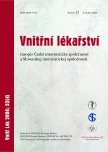Problems with interpretation of low levels of thyroidal hormones conditioned by changes in transport proteins
Authors:
Z. Fryšák; D. Karásek; J. Halenka; J. Skyvová
Authors‘ workplace:
III. interní klinika Lékařské fakulty UP a FN, Olomouc, přednosta prof. MUDr. Vlastimil Ščudla, CSc.
Published in:
Vnitř Lék 2006; 52(4): 389-391
Category:
Case Report
Overview
In clinical practice, we often observe conditions accompanied by secondary drop of binding proteins that bind, more or less specifically, thyroidal hormones. This is usually considered as normal situation that is often not properly interpreted from clinical point of view. In other words, we tolerate such conditions because we build on values of free hormones FT3 and FT4. However, it is very rare to observe significant decrease or even absence of thyroxin binding globulin (TBG) due to inborn error of metabolism. In such situations, the overall level of thyroidal hormones becomes a part of evaluated laboratory profile. Unusual laboratory constellation is in sharp contrast to the so-called „healthy patient“. Due to increased migration of persons, we had an opportunity to take care of a patient of this kind.
Key words:
Thyroxine-Binding Globulin Deficiency
Sources
1. Bartalena L. Thyroid binding proteins: update 1994. Endocr Rev 1994; 3 : 140-142.
2. Benvenga S, Gregg RE, Robbins J. Binding of thyroid hormones to plasma lipoproteins. J Clin Endocrinol Metab 1988; 67 : 6-16.
3. Hoch H, Lewallen CG. Low affinity binding of thyroxin to proteins of human serum. J Clin Endocrinol Metab 1974; 38 : 663-673.
4. Charbonneau M, Dussault JH, Retoff S. A study of the inheritance of tyroxin of tyroxin-binding globulin (TBG) deficiency from data obtained in 13 families detected by a neonatal screening program. Clin Invest Med 1988; 11 : 34-39.
5. Kvistad PH, Myking OL. Hereditary thyroxin-binding globulin deficiency-changed thyroid function tests. Tidsskr Nor Laegenforen 2001; 121 : 1336-1338.
6. Macchia PE, Harrison HH, Scherberg NH. Thyroid function tests and characterization of thyroxin-binding globulin in the carbohydrate-deficient glycoprotein syndrome type I. J Clin Endocrinol Metanol 1995; 80 : 3744-3749.
7. Miyai K, Itoh KF, Abe H et al. Radioimunoelectrophoretic analysis of thyroxin binding proteins in normal human sera. Clin Chem Acta 1968; 22 : 341-347.
8. Mori Y, Refetoff S, Flink IL. Detection of thyroxin-binding-globulin (TBG) gene in six unrelated families with complete TBG deficiency. J Clin Endocrinol Metab 1988; 67 : 727-733.
9. Noguchi T, Ymamori I, Takamatsu J et al. Hereditary complete thyroxin-binding globulin deficiency: Identification by T3 resin uptake test and DNA analysis. Intern Med 1993; 32 : 6-9.
10. Su CC, Wu YC, Chiu CY et al. Two novel mutations in the gene encoding thyroxin-binding globulin (TBG) as a cause of complete TBG deficiency in Taiwan. Clin Endocrinol 2003; 58 : 409-414.
11. Takamatsu J, Refetoff S, Charboneau M. Two new inherited defects of the thyroxin-binding globulin (TGB) molecule presenting as partial TBG deficiency. J Clin Invest 1987; 79 : 833-834.
12. Larsen P et al. William’s Textbook of Endocrinology. 10th edit. Philadelphia: WBSaunders 2003.
Labels
Diabetology Endocrinology Internal medicineArticle was published in
Internal Medicine

2006 Issue 4
-
All articles in this issue
- Chronic nephropathies and disorders of renal function - is it sufficiently diagnosed in patients hospitalised on department of internal medicine and cardiology?
- Non-pharmacologic therapy of hypertrophic obstructive cardiomyopathy – results of therapy based on percutaneous transluminal septal myocardial ablation compared with results of dual-chamber cardiac pacing
- Medical videothoracoscopy in diagnosis and therapy of pleural effusions
- Late cardiotoxicity in patients with malignant lymphoma treated with doxorubicin chemotherapy
- Primary prevention of ischemic heart disease in middle-aged men living in Prague: Results of twenty-year research
- Polymorphism of gene promotor region for MMP-2 in rheumatoid arthritis
- Histiocytosis from Langerhans cell in adults – experience of one department and review of treatment alternatives
- Ubiquitins, proteasomes, sumoylation and application today and in future for cancer and other diseases therapy I. Ubiquitin-proteasome system and the transcription factor NF-κB
- The Prophylaxis against Venous Thromboembolic Complications in Internal Medicine - the Gap between Theory and Practice
- Problems with interpretation of low levels of thyroidal hormones conditioned by changes in transport proteins
- Internal Medicine
- Journal archive
- Current issue
- Online only
- About the journal
Most read in this issue
- Medical videothoracoscopy in diagnosis and therapy of pleural effusions
- Primary prevention of ischemic heart disease in middle-aged men living in Prague: Results of twenty-year research
- Ubiquitins, proteasomes, sumoylation and application today and in future for cancer and other diseases therapy I. Ubiquitin-proteasome system and the transcription factor NF-κB
- The Prophylaxis against Venous Thromboembolic Complications in Internal Medicine - the Gap between Theory and Practice
